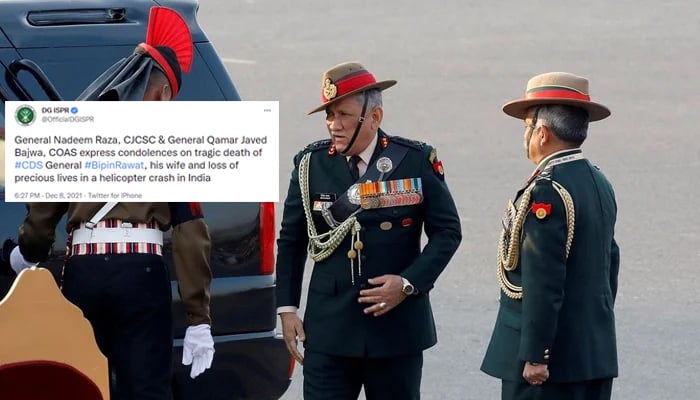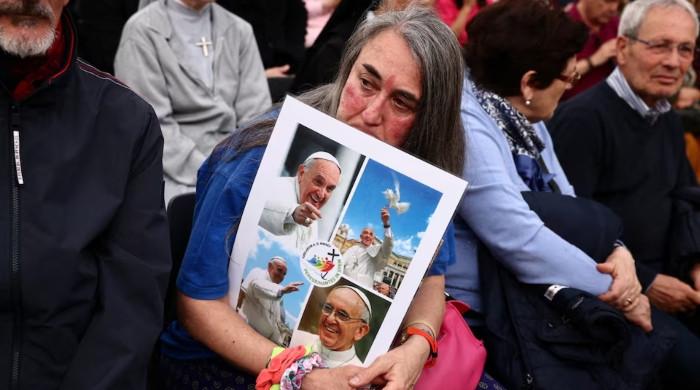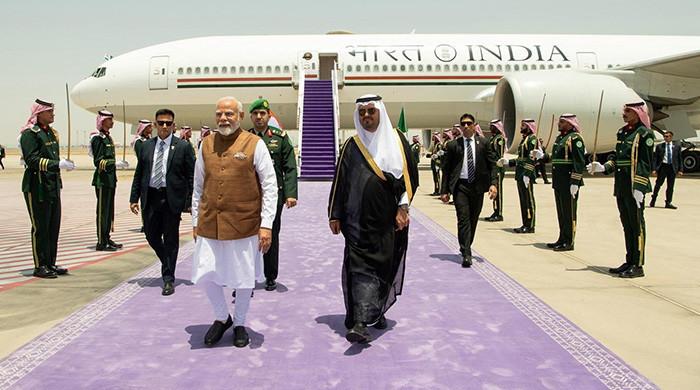India's defence chief Gen Bipin Rawat, 12 others die in Tamil Nadu helicopter crash
Pakistan Army also expresses condolences over the demise of India's first chief of defence staff
December 08, 2021

Thirteen out of 14 people, including Chief of Defence Staff General Bipin Rawat, were killed when an Indian Air Force (IAF) helicopter crashed in Tamil Nadu's Coonoor Wednesday.
"With deep regret, it has now been ascertained that Gen Bipin Rawat, Mrs Madhulika Rawat and 11 other persons on board have died in the unfortunate accident," the Indian Air Force (IAF) announced on Twitter.
"Gp Capt Varun Singh SC, Directing Staff at DSSC with injuries is currently under treatment at Military Hospital, Wellington," the IAF tweeted about the sole survivor of the crash.
Rawat was India's first chief of defence staff, a position that the government established in 2019, and was seen as close to Prime Minister Narendra Modi.
Condolences
Reacting to the news, Indian Prime Minister Narendra Modi took to Twitter and wrote: "As India’s first CDS, Gen Rawat worked on diverse aspects relating to our armed forces including defence reforms. He brought with him a rich experience of serving in the Army. India will never forget his exceptional service."
Expressing grief over the news, Director-General Inter-Services Public Relations (ISPR) Major General Babar Iftikhar wrote on Twitter: “General Nadeem Raza, CJCSC [and] COAS General Qamar Javed Bajwa express condolences on tragic death of #CDS General #BipinRawat, his wife and loss of precious lives in a helicopter crash in India.”
"His untimely death is an irreparable loss to our Armed Forces and the country," defence minister Rajnath Singh said on Twitter.
Indian foreign minister Subrahmanyam Jaishankar said he was "deeply shocked" by the accident and Rawat's death.
"We worked closely together in the last few years. It is a huge loss to the nation," he said.
Moreover, Air Staff Air Chief Marshal Zaheer Ahmad Baber Sidhu also expressed his condolences on the tragic death of Indian CDS Rawat.
The crash
The 63-year-old was travelling with his wife and other senior officers in the Russian-made Mi-17 chopper, which crashed near its destination in southern Tamil Nadu state.
Footage from the scene showed a crowd of people trying to extinguish the fiery wreck with water buckets while a group of soldiers carried one of the passengers away on an improvised stretcher.
Rawat was headed to the Defence Services Staff College (DSSC) to address students and faculty from the nearby Sulur air force base in Coimbatore.
The chopper was already making its descent at the time of the crash.
It came down around 10 kilometres (six miles) from the nearest main road, forcing emergency workers to trek to the accident site, a fire official told AFP.
Career officer
Rawat came from a military family with several generations having served in the Indian armed forces.
The general joined the army as a second lieutenant in 1978 and had four decades of service behind him, having commanded forces in Indian Occupied Kashmir and along the Line of Actual Control bordering China.
He was credited with reducing insurgency on India's northeastern frontier and supervised a cross-border counter-insurgency operation into neighbouring Myanmar.
Rawat was chief of the 1.3 million-strong army from 2017 to 2019 before his elevation to defence services chief, which analysts said was to improve integration between the army, navy and air force.
He was considered close to the Modi government and turned heads last month when he reportedly made an approving reference to "lynching terrorists" in the contested territory of Kashmir.
The Mi-17 helicopter, which first entered service in the 1970s and is in wide use by defence services around the world, has been involved in a number of accidents over the years.
Fourteen people died in a crash last month when an Azerbaijani military Mi-17 chopper went down during a training flight.
In 2019, four Indonesian soldiers were killed and five others wounded in central Java in another training accident involving the aircraft.
India's air force said an inquiry was underway into Wednesday's accident.
Indian news agency ANI had earlier tweeted about the crash, saying that 14 people in total were on board the chopper, including the Indian defence assistant, IAF pilots, and security commandos.
— Additional input from AFP











